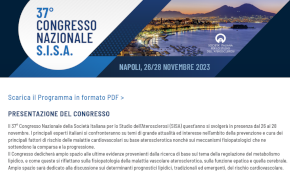 Rivista in lingua italiana
Rivista in lingua italiana
riservata ai Soci SISA
Ultimo numero:
Anno 14 • N.4/2023
Abstract
Impact of PCSK9 inhibition on coronary atheroma progression: Rationale and design of Global Assessment of Plaque Regression with a PCSK9 Antibody as Measured by Intravascular Ultrasound (GLAGOV)
Puri R, Nissen SE, Somaratne R, Cho L, Kastelein JJ, Ballantyne CM, Koenig W, Anderson TJ, Yang J, Kassahun H, Wasserman SM, Scott R, Borgman M, Nicholls SJ.
Am Heart J. 2016;176:83-92
BACKGROUND: Statin-mediated low-density lipoprotein cholesterol (LDL-C) lowering fails to prevent more than half of cardiovascular events in clinical trials. Serial plaque imaging studies have highlighted the benefits of aggressive LDL-C lowering, with plaque regression evident in up to two-thirds of patients with achieved LDL-C levels <70 mg/dL. Proprotein convertase subtilisin/kexin type 9 (PCSK9) inhibitors permit LDL-C-lowering by a further 54% to 75% in statin-treated patients. The impact of achieving very low LDL-C levels with PCSK9 inhibitors on coronary atherosclerosis has not been investigated.
AIMS: To test the hypothesis that incremental LDL-C lowering with the PCSK9 inhibitor, evolocumab, will result in a significantly greater change from baseline in coronary atheroma volume than placebo in subjects receiving maximally tolerated statin therapy.
METHODS: A phase 3, multicenter, double-blind, randomized, placebo-controlled trial evaluating the impact of evolocumab on coronary atheroma volume as assessed by serial coronary intravascular ultrasound at baseline in patients undergoing a clinically indicated coronary angiogram with angiographic evidence of coronary atheroma, and after 78 weeks of treatment. Subjects (n = 968) were randomized 1:1 into 2 groups to receive monthly either evolocumab 420 mg or placebo subcutaneous injections.
CONCLUSIONS: The GLAGOV trial will explore whether greater degrees of plaque regression are achievable with ultrahigh-intensity LDL-C lowering after combination statin-PCSK9 inhibitor therapy. GLAGOV will provide important mechanistic, safety, and efficacy data prior to the eagerly anticipated clinical outcomes trials testing the PCSK9 inhibitor hypothesis (www.clinicaltrials.gov identifier NCT01813422).

Area Soci
Eventi



 SISA LIPID ACADEMY - Corso avanzato di lipidologia clinica
SISA LIPID ACADEMY - Corso avanzato di lipidologia clinicaModena, 22-23 Giugno 2023
[continua a leggere]Giornale Italiano Arteriosclerosi
HoFH today
 Rivista Italiana della
Rivista Italiana della
Ipercolesterolemia
Familiare Omozigote
Anno 5 • N.1/2023
Rivista NMCD
Diateca
[continua a leggere]
[continua a leggere]
Newsletter
il vostro indirizzo di posta elettronica
Progetto LIPIGEN

Nuovo sito dedicato al Progetto LIPIGEN
Progetto LIPIGEN - Vecchio portale
E' necessario essere loggati come utente
Lipigen per poter accedere alla pagina
PROject Statin Intolerance SISA
PROSISA – PROject Statin Intolerance SISA
E' necessario essere loggati come utente
PROSISA per poter accedere alla pagina
GILA - Lipoprotein Aferesi
Gruppo Interdisciplinare Lipoprotein Aferesi
(Accesso Gruppo GILA-Lipoprotein Aferesi)
E' necessario essere loggati come utente del Gruppo GILA per poter accedere
Gruppo Interdisciplinare Lipoprotein Aferesi
(Documentazione ad accesso libero)
Pagina informativa per medici e pazienti








